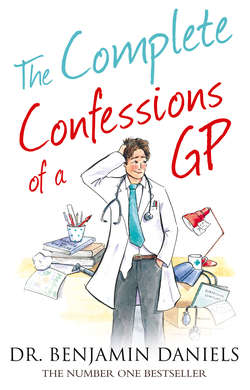Читать книгу The Complete Confessions of a GP - Benjamin Daniels - Страница 22
The elderly
ОглавлениеMy first patient of the morning is Mr A. He is 35 and has a sore ear. He only comes to the doctor about twice a year. I look inside and it is blocked with wax. During his ten-minute appointment I have explained the diagnosis, had a bit of a chat and sent him on his way with some ear drops. The medication is cheap, he gets better and I feel happy as a doctor that I have cured my patient. I am also running on time and know that I will get to the coffee before all the nice biscuits have been eaten by the receptionists.
My second patient of the morning is Mrs B. She is 87 and has come in with painful legs, a sore back, dizzy spells and some breathlessness. It takes her nearly half of her appointment time to shuffle in from the waiting room and take off her four cardigans. She is lonely and socially isolated and really wants to chat. She is a bit forgetful and not very good at giving me a clear story about what hurts when and where. She is already on a multitude of drugs, which she often forgets to take. After a long, disjointed consultation, she departs after 30 minutes without any of her symptoms really being treated and leaves me feeling like I’m not a very good doctor. She will be back next week with a new list of problems. My subsequent patients are annoyed because I am running late and by the time I get to coffee, I am left with a couple of broken, stale digestives.
One of the joys of being a GP is having a close and supportive relationship with elderly patients, but they really do take up the lion’s share of our workload. By definition, the ageing process means that as we get older, more and more things go irreversibly wrong until we finally die. This can be quite hard for both the doctor and the patient to accept. Of course, there are fantastic sprightly 90-year-olds who never visit the doctor and moping 20-years-olds who spend their lives in my waiting room. But generally speaking, the older you get, the more you see your GP.
Treating elderly people with multiple complex medical and social problems is one of the more challenging areas of our work. The goal is to work as part of a team to maintain the person’s dignity and autonomy, while pacifying anxious relatives and navigating through the bureaucracy that is the NHS and social services. Elderly patients are often fantastically appreciative and working with them can be extremely rewarding. Having said all that, it is bloody hard work!
I worked once in a city practice in a young trendy part of town. There simply weren’t many elderly people who lived there. I saw more patients in less time and didn’t do any home visits. I had less disease targets to worry about because few of my young patients had chronic conditions such as heart disease and diabetes. I sat in a trendy coffee shop during my lunch hour, while my GP colleagues around the country traipsed round nursing homes and arranged home helps and hospital admissions. My job was certainly easier but also less rewarding and less interesting.
I recently read that Harold Shipman’s murders were motiveless. I don’t think they were. Most GPs could think of several frail, vulnerable elderly patients who take up a lot of their time. Shipman murdered his. One of the hardest parts of being a GP is taking care of elderly people wanting help for untreatable degenerative diseases. Most of us find that listening and offering some practical support and advice is the best we can do and actually very much appreciated. Shipman clearly viewed things differently and felt it was his right to murder his elderly frail patients. I imagine he enjoyed the power but I also think he was motivated by reducing his workload.
